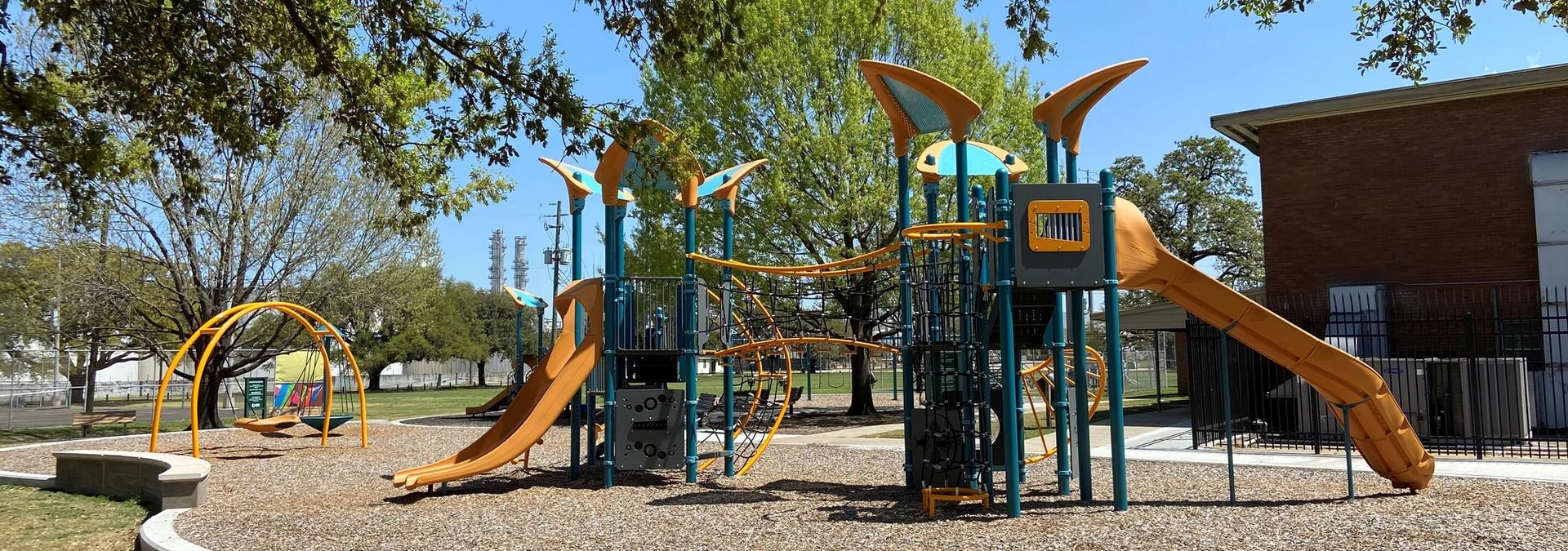
'Nobody was paying attention': A conversation with Public Health Watch's Jim Morris
Valero's donated playground equipment at Hartman Park near their refinery in Manchester. Photo: Matthew Tresaugue.
Jim Morris wondered where the stories were. People along the Texas Gulf Coast — almost always Black and Hispanic, living with lower wealth — were disproportionately exposed to pollution from oil refineries and petrochemical plants. They knew it. He knew it. “Workers were dying of cancer, people in communities around these plants were dying prematurely, kids were getting asthma,” Morris says, “and nobody was paying attention.”
That didn’t sit right with him. “Laws are supposed to protect workers and the public,” he says.
But they weren’t. After getting his start as a journalist in East Texas in the 1970s and, later, reporting from communities along the Houston Ship Channel, Morris couldn’t stop looking for the connections between their health and the industry surrounding them. He wrote for newspapers in Texas and California and spent nearly a decade as an investigative special projects reporter at the Houston Chronicle in the 1990s before landing at the Center for Public Integrity, where he helped edit a Pulitzer-winning series on black lung disease and directed an award-winning global investigation of the asbestos industry.
Last August, after two years of mapping out an organization of his own, Morris launched Public Health Watch, a nonpartisan, nonprofit news site that focuses on injustices in the nation’s health infrastructure and policies, exposes inequities and advances solutions. As executive director and editor-in-chief, he guides coverage through a wide-angle lens — such as this investigation of toxic chemical pollution in Harris County, which examines Texas' ineffective, at times almost indifferent, approach to enforcing clean air laws and the corporate recklessness that’s still leaving families and workers exposed through no fault of their own.
As the Texas Commission on Environmental Quality undergoes a kind of performance evaluation known as a “sunset review,” amplifying the voices of people in communities who most need the agency to start working for them feels especially urgent. Here, Morris reflects on his “simmering rage” and the role he hopes Public Health Watch can play in holding institutions and individuals accountable.
This conversation has been edited and condensed for clarity.
LA: Public Health Watch’s recent piece on the fight to hold polluters accountable in Harris County tells a powerful story about the people exposed to the health harms of air pollution. What are you hoping to accomplish with this site?
JM: There are other nonprofit news outlets that are great at what they do, but we go much deeper than most. We’re not going to run away from a 10,000-word story if we think that’s what it takes to get someone engaged in a topic like air pollution in Texas. You always hear, “That’s just the way it is.” That makes me insane. You’re just throwing up your hands at that point. Then it becomes acceptable. We’re in a good position to show why it shouldn’t be.
In the Harris County piece, we connected voter suppression with pollution control, a line you wouldn’t necessarily draw. The ability to choose your local elected officials really can have an impact on things like environmental enforcement.
We’re going to stay focused on the topic of Texas air pollution for the rest of this year and beyond. We have four to six substantial investigative pieces in the works. This doesn’t include shorter, newsier pieces. We want to keep the spotlight on TCEQ and the EPA.
LA: What role can this kind of investigative journalism play in bringing about change for communities most impacted by pollution?
JM: Well, with this story, we don’t know yet. But just looking at social media — the story was being shared and liked by people we had never heard of before. People from all over the world. It was pretty remarkable and indicated to us that we had struck a nerve or done something beyond the ordinary. And a Texas state representative from Houston said she was “deeply disturbed” by our findings and would propose legislation next year to crack down on polluters.
We’re not expecting miracles here. TCEQ is up for sunset review this year — in Texas, every 12 years, state agencies come up for these top-to-bottom reviews. They rarely lead to dramatic change, but they do sometimes lead to modest changes. The last time TCEQ was up for review, they increased some penalties for polluters. Nothing earth-shaking, but they did something.
Rarely do you see immediate impact in journalism; it’s usually a long game. I’ve done projects where I’ve found out years later that something I wrote led to a policy change. But with more stories like these coming out in the very year that TCEQ is up for review, that at least increases the odds that we’ll have some kind of impact.
LA: I was recently in Houston’s Manchester community, and I recognized in your “Smells Like” documentary a shot of the playground at that park right at the Valero gates — the playground that had been paid for by Valero and painted in Valero brand colors that sits maybe 200 yards from the refinery’s massive petrochemical storage tanks. It ties into what Air Alliance Houston’s Juan Flores said in the piece about how speaking out against polluting industry can threaten your livelihood. I’d imagine this kind of in-depth reporting can help not only expose these injustices, but also provide some context for their complexities — who’s being negligent, who’s actively working against a community’s best interests.
JM: The story highlights the role of the state of Texas. Instead of just being passive and letting polluters do what they want, which is bad enough, they have taken it a step further. We walk readers through what they’ve done: They’ve deliberately thwarted what [Harris County Attorney] Christian Menefee and [Harris County Judge] Lina Hidalgo have tried to do since they took office. That, to me, is infinitely worse than being passive. It says: We’re going to step on you — not only are we not going to make polluters pay, but we’re not going to let you punish them either.
That should really irritate the average Texan. And I don’t know that anybody had ever really put it in those terms before. There had been stories along the way about the state legislature’s efforts to reign in local government, but nobody had pieced it all together to show the impact. I think it’s outrageous.
LA: Is there anything that gives you hope or makes you feel like change is coming?
JM: What gives me hope, and what I hope came through in our story, is people like Menefee and Hidalgo — young elected officials of color who genuinely care about the people in fenceline communities like Galena Park and Manchester. They’re doing what they can to crack down on chronic air pollution. They’ve been thwarted by the state, but just the fact that they haven’t just sat there and said, “We’re not going to be able to do much,” is reason for hope. If you get enough people like them holding local, and ultimately state, office, that’s when you’ll see real change.
Ambrogi is a writer who manages communications with Environmental Defense Fund.
STAY UP TO DATE
The quality of our newsletter is considered satisfactory and poses little or no risk.
SUBSCRIBE

